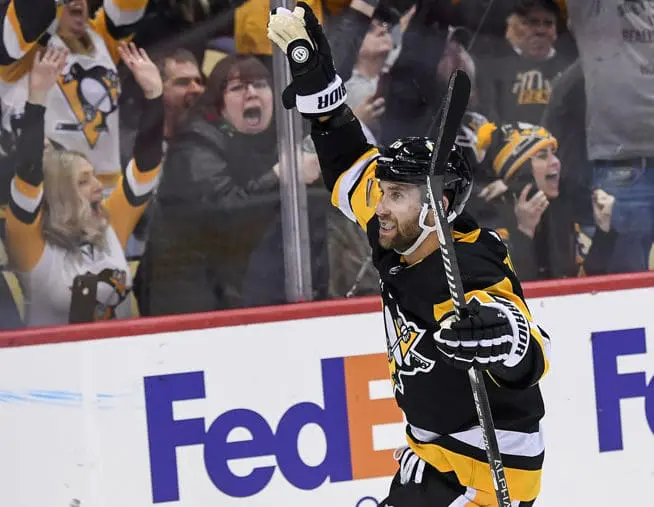Penguins
Molinari: What Should Penguins Do With Zucker?

A few months ago, it all seemed quite simple — and perfectly logical — for the Pittsburgh Penguins.
Jason Zucker was entering the final year of his contract — the one that carries a $5.5 million salary-cap hit — and general manager Ron Hextall looked to have precious little reason to offer him another one.
Zucker, after all, had been slotted into a top-six role when he was acquired from Minnesota Feb. 10, 2020, but had just 23 goals and 24 assists in 94 games through his first two-plus seasons with the Penguins.
Even more troubling was that, after dressing for all 15 games for which he was here before the pandemic aborted the 2019-20 season, injuries forced Zucker to miss 18 of 56 games in 2020-21 and 41 of 82 last season.
Failing to meet offensive expectations is bad enough; fairly or otherwise, a player having to sit out so many games because of physical issues, like Zucker’s core-muscle problem that had to be surgically repaired, might be even more troubling for a team’s decision-makers.
For those reasons, when this season began, Zucker appeared to be a good candidate to move on, whether it was because another club was interested in adding him, or because the Penguins simply would opt against trying to re-sign him when his contract expires next summer.
It was nothing personal. Zucker’s commitment and work ethic never have been questioned, and likely are part of the reason he appears to be so well-liked and respected by his teammates and coaches.
But pro hockey is a bottom-line business, and the Penguins weren’t getting much of a return on the investment they made to acquire Zucker from Minnesota — a first-round draft choice, defense prospect Calen Addison and forward Alex Galchenyuk — or on the salary they were paying him.
And then the first quarter of the 2022-23 season happened. Suddenly, nothing about Zucker’s future is as obvious as it seemed in early autumn.
Yeah, he’s missed two of the Pittsburgh Penguins’ first 19 games, but he also has thrived alongside Evgeni Malkin on the No. 2 line.
Although Zucker wasn’t much of a factor during their 5-3 victory in Chicago Sunday — he was credited with just one shot, and was on the ice for only one goal, which was scored by Blackhawks forward Philipp Kurashev — he has been visible and productive far more often than not.
He has five goals and 10 assists in 17 games, which puts him behind only Sidney Crosby, Jake Guentzel and Malkin in the team scoring race, and his speed and relentlessness make him an excellent forechecker.
And while his fearless style surely can up the risk of lost-time injuries for a guy who is 5 foot 11, 192 pounds, Zucker is just 30 years old, which suggests he could be in his prime for several more years.
Now, 19 games is an extremely small sample size — much can, and likely will, change as this season plays out — but Zucker’s strong start surely could be vexing for Hextall as he tries to determine how to approach Zucker’s long-term future.
Treat him like a guy who can’t be counted on because injuries will keep him out of the lineup so often, or like one who can reasonably be expected to generate roughly a point per game for quite a while?
And, of course, there are other things to consider, most notably the impact retaining Zucker would have on the Pittsburgh Penguins’ salary-cap situation.
He is one of six players currently on their major-league roster scheduled to qualify for unrestricted free agency in 2023 — the others are Tristan Jarry, Teddy Blueger, Danton Heinen, Josh Archibald and Brian Dumoulin — and there’s reason to believe Hextall will try to retain the majority of them.
The details of NHL’s salary-cap range for 2023-24 could have a profound impact on whether he’s able to do so.
The Penguins are believed to have about $63.5 million committed to players now on their roster. and league officials have projected a minimum increase of $4 million in the cap ceiling if the players’ escrow debt to the league is paid off this season. If it’s not, the significant bump in the ceiling would come in 2024-25 and it would rise $1 million from its 2022-23 level of $82.5 million.
If/when the ceiling is raised significantly, it could make a lot of things possible, for a lot of teams.
Hextall also will have to assess the stable of potential replacements if Zucker were to leave, regardless of whose decision it would be. That means evaluating the free agents who don’t re-sign with their clubs before summer, as well players currently in the Pittsburgh Penguins’ prospects pipeline.
At least in the short term, there are few, if any, viable top-six forwards there. And no one currently on the Penguins’ third and fourth lines can realistically be expected to fill in for Zucker for an extended period, let alone permanently.
Mind you, Hextall always could try to trade for a second-line left winger, but as Minnesota’s asking price for Zucker showed, they aren’t cheap.
Two months ago, that option appeared to be one he might have to explore, and perhaps he still will.
But it also is quite conceivable that Zucker will continue to be effective and productive — which, implicitly, means being healthy enough to stay in the lineup — and persuade Hextall that he should be part of the franchise’s future well beyond next spring.














